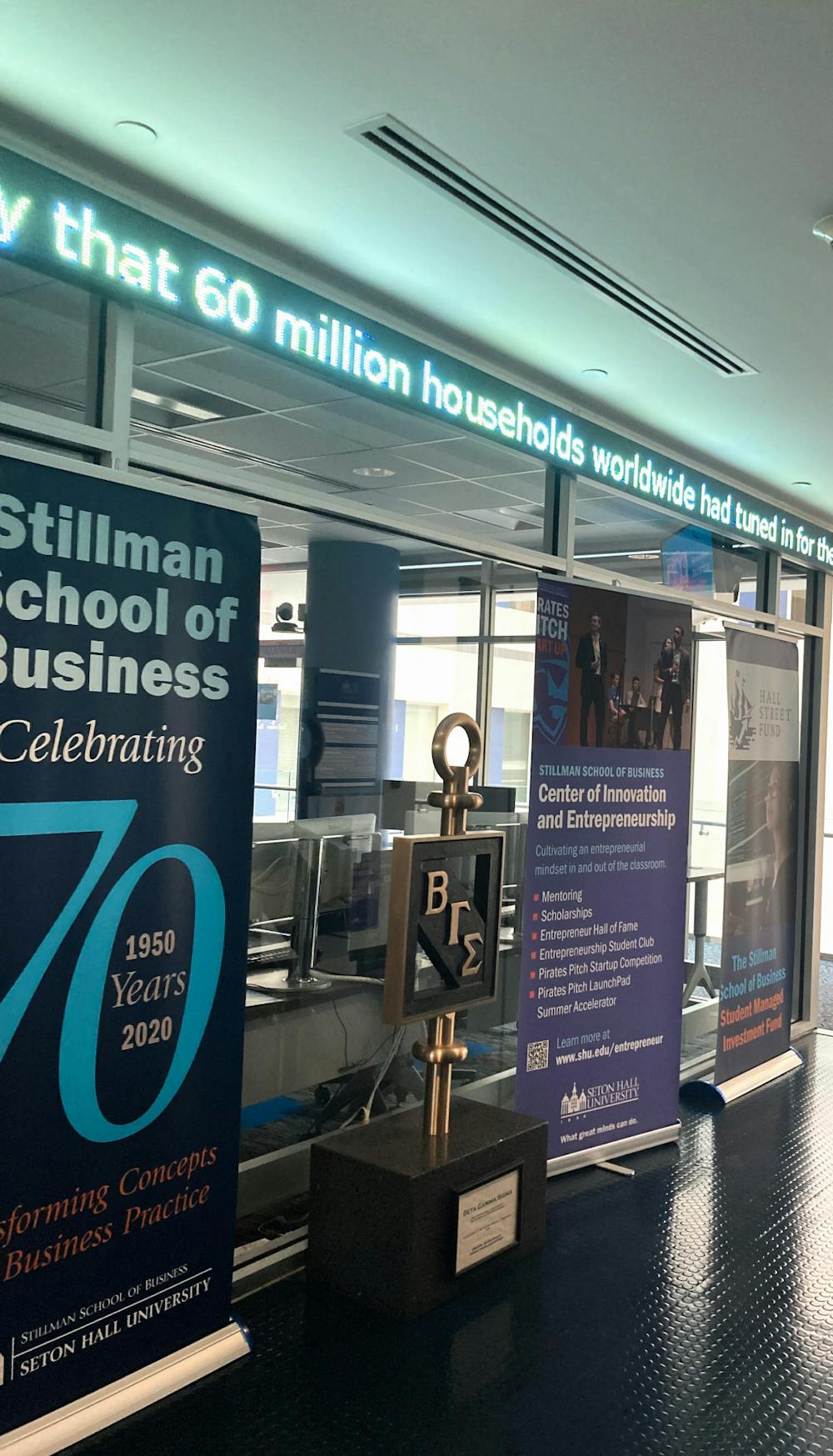Students and faculty at Seton Hall are expressing concern over the Trump administration’s tariffs on imported goods, which may increase consumer costs.
President Donald Trump’s 25% tariffs on imports from Canada and Mexico went into effect on March 4, but just two days later, he paused the tariffs until April 2. This decision occurred alongside Trump choosing April 2 as “Liberation Day,” the day when he is set to announce his reciprocal tariffs, which will apply to countries that are the largest contributors to the $1.2 trillion U.S. trade deficit.
Tariffs are taxes charged on goods imported from other countries, according to the BBC. So, companies that bring foreign goods into the country must pay the tax to the U.S. government.
Economists say these tariffs will ultimately raise prices for everyday Americans, as companies typically pass down taxes on imports to the customer.
“Anyone making less than $200,000 a year is going to feel it,” said Prof. Hector Lozada, director of the Stillman School’s Institute for International Business and an associate professor of marketing.
However, Peter Navarro, Trump’s senior trade adviser, insisted that the tariffs would raise $600 billion per year, which would allow for a tax cut on middle-class and blue-collar Americans, and that anyone worried about short-term disruptions to the economy should “trust in Trump.”
Lauren Geiger, a junior marketing major, said she is worried about the potential financial stress.
“I’m extremely discouraged about the future, not just because of grocery prices, but everything,” she said. “I think [the tariffs] are going to make it extremely difficult, especially as a college student.”
Geiger added, “[Trump] does not look out for the common American person, and this proves exactly that.”
Prof. Mark Schild, instructor of finance in the Stillman School of Business and associate dean for student success, agreed that students will feel the effects of these tariffs.
“Books are going to cost more because paper costs more,” he said.
A junior political science and philosophy major, who asked to remain anonymous because of their affiliation with a student organization that does not allow them to make public political statements, also voiced concern about the cost of living.
“I feel very conflicted and also threatened at the same time,” the student said. “Everything is so expensive now. I work all the time, and I still don’t have enough money somehow.”
Trump has argued that the tariffs will boost U.S. manufacturing, protect jobs, and generate tax revenue to strengthen the economy. Meanwhile, the stock market plummeted on March 28 ahead of the president’s “Liberation Day,” which will also include a 25% tariff on cars and car parts that are imported into the U.S.
Schild said that the government cannot simply move all production to the U.S. without added costs.
“We can buy a replacement wine from California, but the glass for the bottle might be imported from Canada,” Schild said. “So somewhere, there is going to be an added cost.”
The anonymous student also commented on these supposed “boosts” for Americans.
“The potential benefits that I’ve seen are risky and uncertain,” the student said. “What is more certain is that they will be detrimental to the American economy and our pockets.”
The Trump administration maintains that the tariffs are meant to manage illegal immigration and drug trafficking. But Schild argues that the tariffs will not achieve that goal.
“We have to deal with that problem from the inside,” Schild said. “Why do we have a drug problem? Because there is a market for it.”
Lozada also questioned the tariffs’ role in addressing these issues.
“There is always a way they come in, and it’s not necessarily through the border,” Lozada said. “Instead of focusing on money and items, we should focus on the well-being of people.”
Lozada said the tariffs have led to an ongoing trade war after countries like Canada and China hit back at Trump’s recently imposed tariffs with retaliatory tariffs on U.S. exports, while the European Union has threatened to do the same next month.
“We are not making America more competitive,” Lozada said. “We’re not even making America more at peace with the world. We are just creating a lot of enemies in the commerce sphere that we didn’t have before.”
Lozada said that on top of this, the back-and-forth that has come out of these tariff announcements has caused market uncertainty to worsen.
“One day they tell you one thing, and two days later, they backtrack,” he said. “Uncertainty is not a friend of the market.”
With the stock market nosedive on March 28, the tariffs’ strain on the economy could affect job prospects for students after graduation.
“If businesses slow down, you’re already seeing layoffs,” Schild said. “So if it’s already hard to get jobs, it’s going to get even harder. The first people who suffer are the people they haven’t hired yet.”
Ahead of midterm elections next year, Schild urged voters to take action.
“Midterm elections are a way for people to voice their dissatisfaction,” Schild said. “If people are really unhappy with what’s happening, that’s their chance to make a change.”
As uncertainty looms, students and faculty at SHU brace for economic impact.
“If people want to control their destinies, they have to make their voices heard,” Lozada said. “Sadly, we have messed up royally, and your generation is going to have to clean up the mess.”
Morgan Dence is a writer for The Setonian’s News section. She can be reached at morgan.dence@student.shu.edu.





